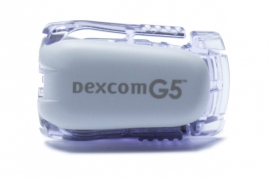
--Courtesy of Dexcom
Dexcom wants regulatory approval so that the information gathered by the device from a patient could be used to administer insulin without the standard fingerstick-based blood reading. If approved by the agency, analysts have said Dexcom could eventually garner Medicare coverage and grow the use of its device by as much as 23%.
The Clinical Chemistry and Clinical Toxicology Devices Panel, which met Thursday, voted 8-2 to support that there is reasonable assurance that the G5 Mobile CGM system is safe for the proposed indications for use.
It voted 9-1 that there is reasonable assurance that the device is effective for the proposed indications for use, and in an 8-2 vote, supported the benefits of the G5 Mobile CGM system outweighed the risks for the proposed indications for use.
"This recommendation is a big milestone for people with diabetes," Kevin Sayer, DexCom’s president and CEO, said in a statement, “We commend the FDA for bringing this important subject into a public forum, and thank the panel members, as well as the public speakers for their willingness to participate.”
Still, there was some concern before going into the panel review. Those concerns centered on the heavy reliance of data from computer simulation studies and the limitations of the human factor studies conducted by Dexcom, according to a review by Jefferies, a securities firm that rates Dexcom shares a buy.
Additional discussion at the review focused on how a majority of CGM patients already make dosing decisions based on information gathered by the devices and there might need to be appropriate training, which is only possible by a labeled indication. It was suggested by the panel that training instructions be detailed on the label itself.
Perhaps one of the key takeaways is that the regulatory agency and Dexcom remain in discussions about a post-marketing study design, which will have to be locked down before final FDA approval is granted. Wall Street analysts believe the final decision on that study could establish a clinical standard that all other devicemakers will need to meet if they want to secure a dosing claim for their own CGMs.
Analysts expect FDA approval for the new indication to come later this year.
- check out Dexcom’s release
- read a Jefferies analysis (pdf)
Related Articles:
FDA panel docs upbeat ahead of Dexcom panel
Google's Verily, Dexcom aim to launch mini glucose monitor in 2018, with next-gen by 2021
DexCom, Tandem Diabetes pursue combined CGM/insulin pump